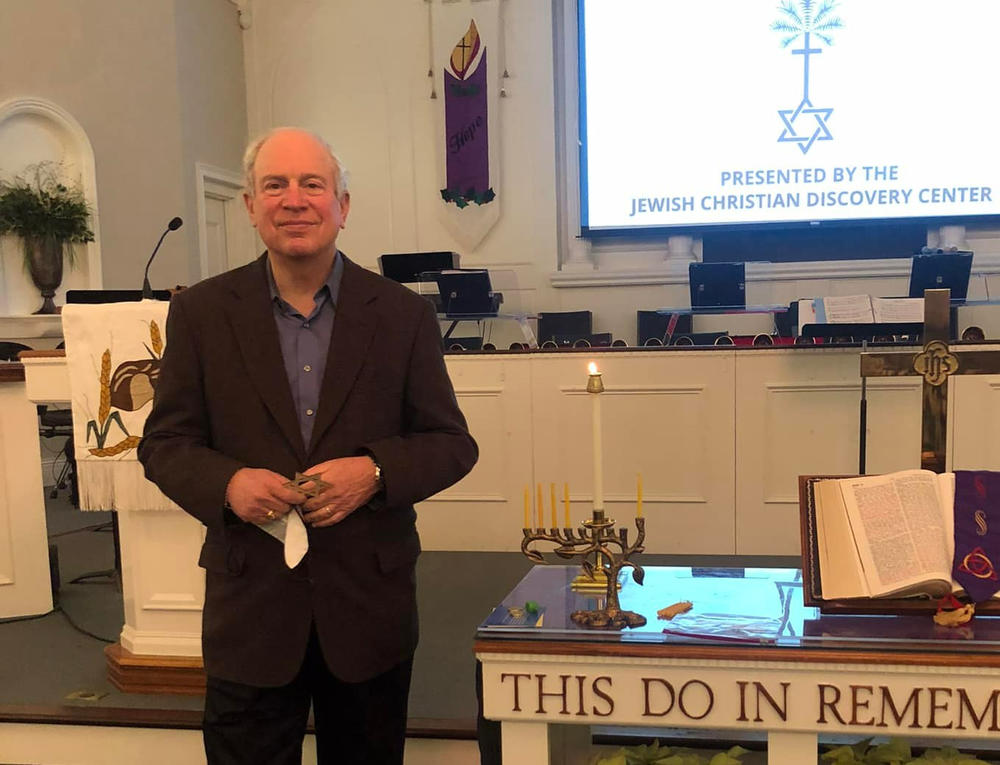
Section Branding
Header Content
Georgia religious leaders push back on antisemitism
Primary Content
LISTEN: Ahead of the holiday, GPB's Peter Biello spoke with Rabbi Albert Slomovitz and Pastor Michael Tutterow.

A group of religious leaders in Georgia is pushing back against high-profile antisemitic statements with an appeal to Christians. In a Thanksgiving letter, they say there is no place in the heart of someone who follows the teachings of Jesus Christ for hatred based on religion.
Rabbi Albert Slomovitz, the founder of the Jewish Christian Discovery Center in Marietta, and Pastor Michael Tutterow of Heritage Baptist Church in Cartersville, spoke with GPB's Peter Biello.
Peter Biello: Rabbi, why did you want to make this particular argument against antisemitism an argument based on the words of Jesus Christ?
Albert Slomovitz: I will give you the historical perspective a little bit. We've been at this for 2,000 years, and unfortunately, I don't see us making progress in increasing our understanding. That was one of the reasons I founded the Jewish Christian Discovery Center. I'm a former military chaplain. I served 20 years, and I have some advanced degrees from Loyola University of Chicago, which, as you know, is a Jesuit school. So I kind of lived in an interfaith environment and found that most people simply didn't know about Jews and Judaism, really. Not knowing is okay. There's a lot of things we don't know about. But the not knowing in this case — the ignorance can bleed over quickly into prejudice.
Peter Biello: Pastor Michael, you signed on to this letter. Tell me why and what weight a pastor brings to this message.
Michael Tutterow: I think if you look at the early Christian church, it was an interfaith movement. There were multiple religions, not just Judaism, at the time Christianity began to spring up, but multiple religions, especially as they crossed into what the Bible refers to as Gentile territory — what we now know is the rest of the world. And once it left the borders of Israel, it had to figure out how to stay in dialogue with people of different cultures, races, ethnicities and religions. It's just been part and parcel of what Christianity originally began as. But as the rabbi alludes to, there quickly became some deterioration between the church and synagogue. And unfortunately, that led to some historical atrocities perpetrated by Christians. Anything that distorts Jesus's message of "love God, love your neighbor" — which comes right from the Hebrew scriptures — Is a distortion of Christianity and it's an insult to Jesus.
Peter Biello: Rabbi, you're calling this letter a Thanksgiving letter of tolerance. Do you think people are more open to these messages at this time of year?
Albert Slomovitz: It just struck us that it would be a perfect opportunity when people sit down for their Thanksgiving meal to bring it up, bring it up with friends and family, children and grandchildren.
Peter Biello: Seems like you've done a lot of thinking, rabbi, about how people with disparate views can come together and have a civil conversation and learn from each other. That's going to be the situation for a lot of people over Thanksgiving. I'm wondering if you have any tips to offer people who are going to be speaking with people who they know they disagree with over Thanksgiving and how maybe they can come to some kind of mutual, respectful understanding?
Albert Slomovitz: Well, I think it's easy. No. 1, try to find a point of connection. It can be a sports team. It could be a hobby. So don't start out abruptly. In counseling, it's called a soft beginning. So just start gently and just do some introductory comments and set the stage and say, I'd like us for the next few minutes, just have a conversation, a conversation about thoughts and different views and all that. And if you do that, if you set the stage and you let people know that they have permission to do so, then I think you're going to have some wonderful conversations.
Peter Biello: Pastor Michael, would you like to add to that?
Michael Tutterow: Obviously, a starting point is believing the best about one another when you find those places of common ground or common interests. It does breed the trust that allows you to have deeper conversations about anything. And when you start to go into the political conversations with people, then you offer one another the benefit of the doubt. We both love our country. We both love our state. We both love our communities. We want good things for them. And it just means that when we're on different sides of the political aisle, we believe that there are different ways to achieve those good ends. And if we can stay focused on what are the good ends that we want, then it keeps us from demonizing each other. And then there's always the disclaimer: "We may just have to agree to disagree" and then go get the pumpkin pie.

